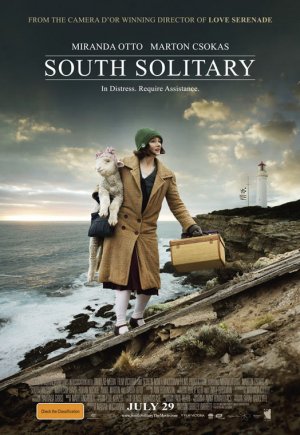
SOUTH SOLITARY
Australia, 2010, 113 minutes, Colour.
Miranda Otto, Marton Csokas, Essie Davis, Rohan Nichol, Barry Otto.
Directed by Shirley Barrett.
This is the kind of drama an audience needs to be ready for. As the title indicates, it is a story of isolation, so not a fast-paced action film. In tone and style, it is akin to restrained European film-making.
South Solitary is a fictitious lighthouse island off the mainland coast of Australia. The time is 1927. As the film opens, there has been a tragedy on South Solitary, the lighthouse keeper killing himself. An inspector arrives to make a report. He brings his niece with him to assist in preparing the report. There is a family on the island, living something of a rough and ready existence. There is also another keeper, Fleet, a bomb disposals expert during World War I who is still suffering mentally from the experience. It is noted that the keeper who killed himself also served in World War I. This theme of war, death and illness underlies the film.
The first half of the film establishes the situation and the characters. The rugged island, the surrounding waters, the cliffs, the windswept top with its horse and straggling sheep help the audience feel immersed in this physically isolated and difficult world. The inspector (Barry Otto) is a stickler for detail and regulations, something of a bureaucratic snob. His niece, Meredith (Miranda Otto, who is the central focus of the film), has lost her fiancé in the war and is at a loose end emotionally and with jobs. The mother of the family is a tough type (Essie Davis), her husband (Rohan Nichol), a friendly type, too friendly with Meredith for his own good. There are three children, one little girl whom Meredith befriends, especially in their fondness and care for a lamb, Lucille.
Perhaps a difficulty for some audiences is that the pace of this part of the film is somewhat similar to living on South Solitary, meandering, governed by the roster in care for the light, and limited in the scope for where people can actually go.
When the family and the inspector leave, Meredith and the taciturn Fleet, have to co-exist. He keeps politely to himself. She needs company and some affection. They begin to bond very slowly. He embroiders and reads to occupy the time. She does the same but tries for conversation. The main action is a fierce storm which wreaks some damage and puts a strain on both of them.
This two-hander half of the film is more persuasive than the first half, an opportunity to be with these two characters and understand them better, feel her need for companionship and observe and feel for his coming out of himself very gradually.
While Miranda Otto brings her character to life, it is Marton Czokas, speaking laconically and courteously with a Welsh lilt, who captures the interest. A very gentle finale, open-ended.
1. A mood drama? Period drama? Emotions and reticence?
2. The visuals of the island, rugged, isolated, the boats going to the island, rowing, the authorities being seasick? The lighthouse, the steep slope, the rail winch? The houses, the top of the island, the scrub, the animals? The majestic cliffs and the sea? The musical score?
3. The title, the island, the emphasis on solitude? The physical solitude, psychological, emotional?
4. The 1920s, the role of lighthouses, the keepers? Communication and isolation? Pre-radio, use of semaphores? Lights? Government, regulations? The shipping? Mistakes? The period and the costumes, décor, styles? Post- World War One and trauma?
5. The trauma after World War One, the returning troops, suicidal and depressed? The background of bomb disposal work, shellshock, the soldiers experiencing physical and mental turns? Silence, preferences for being alone? Meredith and the death of her fiancé in the war?
6. The focus on Meredith, her uncle’s niece, in the boat, her luggage, the climb? Meeting the children? The little girl, the lamb, calling her Lucille? Accommodation? Her work, collaboration on the report? With the Stanley family? The mother and her harshness, the boys and the animals, the father and the tour of the island? Her need for affection, her dead fiancé? The needs, Harry’s attentions? His advances, seductive, her allowing herself to be seduced? The consequences?
7. Her uncle, fussy, sick on the boat, his demands, wanting his tea, imposing the regulations? The various offences and failings in helping shipping? The report? On duty? Meredith, the affair? His leaving?
8. The Stanley family, hard life, food and lack of food, the animals, no school for the children, the little girl, looking after Lucille, feeding the lamb? Friendship with Meredith? Harry, his attitudes, easygoing? His talk, the rosters? His advance on Meredith? The family leaving?
9. Fleet, his background, silent, helping with the duties? Meredith and Fleet alone, talking? Sharing, not sharing? The common interest in embroidery? The semaphore training, Meredith’s mistakes? Her wearing the flags, Fleet’s reaction? Books? Aloof?
10. Meredith and the effect of the relationship, her staying on, helping with the duties, talking for company for Fleet, embroidering?
11. The visuals of the storm, its impact, effect? Her wanting to go to the toilet, the experience? The calm after the storm?
12. Meredith preparing to leave, encountering Lucille again? The bonds with Fleet, touches of affection, the awkward movement, the embrace, the promise to write letters? Her going down the cliff? What future?
13. A study of relationships, loneliness, lack of affection, love?